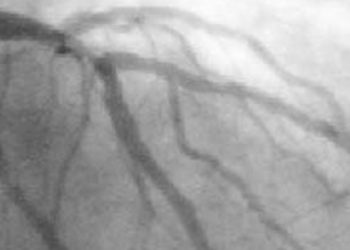ARIC study finds obstructive and restrictive spirometry results to be associated with heart failure
1. Among patients with no pre-existing heart failure or pulmonary disease, both obstructive and restrictive spirometry patterns were associated with elevated pulmonary pressures, higher NT-proBNP levels, and an overall increased risk of incident heart failure, particularly in late life.
Evidence Rating Level: 2 (Good)
It is well known that pulmonary and cardiac function declines with increasing age; however, the association of pulmonary dysfunction with late-life heart failure and cardiac function is not elucidated in current literature. In this longitudinal cohort study, 3854 participants belonging to the Atherosclerosis Risk in Communities (ARIC) cohort with no pre-existing heart failure or pulmonary disease were assessed over five visits for lung function using spirometry, and cardiac structure and function using echocardiography. Incident heart failure was documented based on active surveillance of hospitalizations and by participant self-report. Interestingly, lower FEV1/FVC ratios on spirometry were associated with higher NT-proBNP values. Additionally, lower ppFVC (percent predicted forced vital capacity) was associated with left ventricular hypertrophy, increased left ventricular filling pressure, and high-sensitivity C-reactive protein. A lower FEV1/FVC ratio was associated with an increased risk of incident heart failure with preserved ejection fraction (HR 1.31, 95%CI 0.98-1.74) and heart failure with reduced ejection fraction (HR 1.24, 95%CI 0.91-1.70), when adjusted for confounding variables. In conclusion, the results of this study affirm that poor performance on spirometry with reduced FEV1/FVC ratio as well as lower ppFVC values is associated with increased risk of cardiovascular comorbidities, particularly in late life. As lung dysfunction is relatively easy to assess using spirometry, elderly patients at risk for late-life heart failure can be identified based on pulmonary function. However, it is important to note that this study has several limitations. For instance, spirometry was performing without using bronchodilators so reversible obstruction was not detected. In addition, as this cohort was followed for more than 20 years, survivorship bias may be present, ultimately confounding the incidence of heart failure in this population. Nonetheless, these findings warrant future research into targeting pulmonary dysfunction to decrease risk of heart failure in older adults.
Click here to read the study in JAHA
Image: PD
©2022 2 Minute Medicine, Inc. All rights reserved. No works may be reproduced without expressed written consent from 2 Minute Medicine, Inc. Inquire about licensing here. No article should be construed as medical advice and is not intended as such by the authors or by 2 Minute Medicine, Inc.





![The ABCD2 score: Risk of stroke after Transient Ischemic Attack (TIA) [Classics Series]](https://www.2minutemedicine.com/wp-content/uploads/2013/05/web-cover-classics-with-logo-medicine-BW-small-jpg-75x75.jpg)

![siRNA against antithrombin alleviates symptoms of hemophilia [PreClinical]](https://www.2minutemedicine.com/wp-content/uploads/2015/04/clot-CCWiki-75x75.jpg)